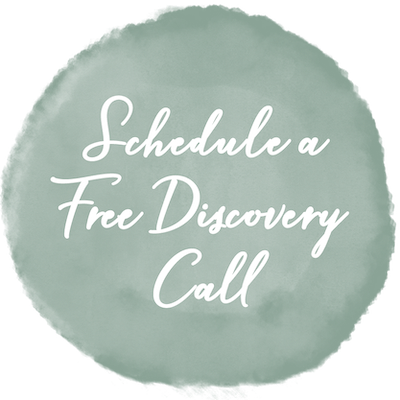When I first developed my eating disorder at age twelve, I didn’t fully understand all of my reasons for doing so. All I knew was that it helped me to feel better about myself, especially in comparison to others, in a way that I could control when all other ways felt uncontrollable.
Thankfully, we do not need to know why we developed our eating disorders in order to begin the recovery journey and to eventually fully recover.
Regardless of why your eating disorder developed, there are most likely underlying and overt functions that it is serving for you now which make it hard for you to give it up without having alternative ways for meeting these needs.
In my coaching work, I share with clients that my job isn’t to take away their eating disorder but rather to help them strengthen their inner core healthy selves so that this part of them can put their eating disorder out of a job.
This is where exploring what therapist Carolyn Costin calls The Real Issues can be so helpful, as this can help you to become aware of the functions that your eating disorder is serving in your life. Then, you can determine which functions your healthy self will need to learn how to meet for you so that your eating disorder is no longer needed.
My Real Issues As An Example
As I wrote about in my last post, one way that my eating disorder served me was by protecting me from my inner bulldog, my inner taskmaster, who would attack who I was as a person and every little thing I didn’t do perfectly.
After I developed my eating disorder, I could distract my inner bulldog with my eating disorder, like throwing it a bone.
In this way, as long as I didn’t break any eating disorder rules, I felt like I might be good enough and like I could do things others couldn’t, like my discipline and willpower made up for the other defects that I had.

Looking at The Real Issues list from the 8 Keys to Recovery from an Eating Disorder book, I can see that my eating disorder was meeting my Real Issues of:
- Drive for perfection
- Poor self-worth
- Need to be special/unique
- Safe place to go/doesn’t have coping skills, and
- Terrified of not measuring up.
For me, then, recovery truly began to feel possible once I began to find ways of getting these needs met in other ways.
My Real Issue #1: Drive for perfection
I was so terrified of not being perfect, and my eating disorder gave me a controllable way to feel like I was perfect at something - my ability to deny myself food and to exercise more than others and exert willpower and discipline over myself.
It wasn’t until I began to feel good enough about myself without needing to be perfect or without always having to prove myself that I could finally begin to let go of the eating disorder’s hold.
My Real Issues #2-3: Poor self-worth and Need to be special/unique
I remember feeling that deep down there was something fundamentally flawed with me, and that at my core somehow I didn’t measure up…. Because of this, I always sought external proof that I was special and unique in order to disprove this fear for myself.
Being able to have more discipline and willpower and to eat less and exercise more than others gave me this sense of proof.
It wasn’t until I could accept my humanity and accept that I wasn’t better than others nor was I fundamentally flawed that I could gradually begin to let go of the eating disorder’s rules in a lasting way.
My Real Issue #4: Safe place to go/doesn’t have coping skills
When things in my life felt like they were falling apart or when I felt bad about myself for any number of reasons, being able to prove my discipline and willpower through my self-denial and thinness felt like a safe place to go. It felt like the only way I knew for how to cope with feelings of shame and self-doubt.
It wasn’t until I could create a safe place within myself by developing more self-compassion and self-acceptance, and the ability to soothe myself, that I no longer needed the eating disorder as a safe place to go in order to cope.
My Real Issue #5: Terrified of not measuring up
Lastly, my eating disorder gave me a false sense of being able to measure up, and this Real Issue is very much related to all of the previous ones.
Feeling at my core that I wasn’t good enough and needing to constantly compare myself to others to try to disprove this intolerable belief was exhausting, especially when it was with things so out of my control like popularity, intelligence and athleticism.
However, my eating disorder felt like something I could control, and something I felt I could do that no one else could.
It wasn’t until I could develop a sense of self-worth not based on needing to compare myself to others that I could finally give up my eating disorder for good.

Your Real Issues, and the work you do on your recovery journey, will likely look very different from mine, as we are all so unique.
I wanted to share what my experience looked like though to provide you with hope that even though this work can seem daunting and be difficult, recovery is possible.
It may take what feels like a painfully long time, and that's okay. You didn't develop your eating disorder overnight, and so it makes sense that it won't disappear overnight either.
The Real Issues List
The full Real Issues list from Carolyn Costin’s work includes fourteen of the most common underlying issues that she has come across in her work with eating disorder clients. They are:
- Poor self-esteem/self-worth (I’m afraid of myself and of being out of control. • I’m not worthy. • People don’t like me. • I can’t trust my own judgments or make decisions).
- Need for distraction (When I’m bingeing or throwing up, I don’t think about anything else. • I need something that distracts me from my thoughts and feelings. • Worrying about my weight keeps me from worrying about other things).
- Fill up emptiness (Something is missing in my life and I try to fill it with my eating disorder. • I feel empty inside and bingeing takes me away from that temporarily. • Eating fills up my emptiness. • All my eating disorder rituals help me fill up a void in my life).
- Belief in a myth (I will be happy and successful if I am thin. • Thinner people are happier. • I have to be thin to be attractive and desirable. • Losing weight will solve my problems).
- Drive for perfection (I have to be the best at everything, whether it is taking a test or dieting. • I have the willpower to do things others can’t do. • I’m either fat or thin. • I’m either perfect or a failure. • If I can’t win or be the best, I won’t try).
- High-achievement oriented (I feel constant internal pressure to work hard and achieve. • I can only achieve a good body through my eating disorder. • I am driven everywhere else and use my bulimia as a release. • Restricting is a real achievement, mind over matter, literally).
- Desire to be special/unique (I get a lot of attention for my willpower over food. • I don’t know who I would be without my eating disorder. • My eating disorder causes others to worry about me and take care of me. • My eating disorder makes me stand out and be different. • My low weight is the only special thing I have).
- Need to be in control (I have to be in control of my body, and what goes in and out of it. • My eating disorder helps me feel in control of my “out of control-ness.” • My eating disorder behaviors keep my feelings under control. • My eating disorder is the one thing no one has control over but me).
- Wants power over self, others, family, life (My eating disorder gives me power over my body. • I feel powerless most of the time, except when it comes to my eating disorder. • My eating disorder gives me power over others. • It’s powerful to be able to resist food, like a saint or monk).
- Wants respect and admiration (I finally got respect from my peers when I lost weight. • I wanted to be admired and tried restricting to lose weight, but I couldn’t do it, so I had to throw up. • When I binge I am rebelling because I know I will never get the respect and admiration that people get for being thin. • People respect my ability to resist food).
- Has a hard time expressing feelings (I don’t know how to express my anger, so I binge and purge. • I feel like I swallow my feelings when I binge. • I can’t deal with conflict or confrontation so I resort to my eating disorder. • Restricting helps me shut down and deny my feelings).
- “Safe place to go”/doesn’t have coping skills (My eating disorder is a “special world” created to keep all the “bad” out. • If I follow my own imposed rules, it helps me feel safe. • My eating disorder helps me get taken care of without asking for help. • My eating disorder has helped me avoid taking on adult responsibilities).
- Lack of trust in self and others (I don’t trust people so I isolate from them with my eating disorder. • I don’t trust anybody; I use my eating disorder as my best friend. • I can never make a decision; bingeing and purging provides procrastination. • It’s easier just to follow my eating disorder rules than to trust myself or anyone else).
- Terrified of not measuring up (I know I can’t compete, so I let my eating disorder takes me out of the running. • I won’t have anything if I don’t have my eating disorder. • I’m constantly comparing myself to everyone. • I am terrified of being fat. • I am terrified of being deprived. • I am terrified of being deprived and of being fat).
Published in 8 Keys to Recovery from an Eating Disorder by Carolyn Costin and Gwen Schubert Grabb.

I believe that we each have a need for all of these in some way, but for each of us some of these issues will feel more pressing, or unable to be met in other ways, more than others, and so our eating disorders address these issues for us in ways that are unique to our journey.
Also, I think it’s so important to note how valid all of these issues are…. If we’re not able to satisfy them for ourselves in other ways, and if our eating disorders feel able to, even if not in the most sustainable manner, then it makes sense that we will cling to them….
Which Real Issues struck a chord with you, and feel like, Yes, this is what my eating disorder does for me? (You can explore this further using the journal prompts below should you wish to).
Final Thoughts
I hope any realizations you have while exploring this topic also come with a sense of compassion and empathy for yourself, as the needs connected to these issues are so beautiful, and of course we would try to find a way to meet them in any way we can....
The gradual, healing work then will be to find ways of meeting these needs in deeper, more self-compassionate, and more unconditional and sustainable ways….
This can take time, and is why recovery does not happen overnight.
Do your best to have patience and compassion for yourself, and to get support. It helped me so much to have a therapist I trusted, and numerous self-help books, to give me new strategies for how to cope with myself and life.
With so much hope for your journey of healing and self-discovery,

Journaling Prompts:
(Adapted from 8 Keys to Recovery from an Eating Disorder Workbook by Carolyn Costin and Gwen Schubert Grabb)
- Which Real Issues resonated with you the most? For each one, which examples in brackets felt the most relevant for you?
- Are there any issues not on this list that feel true for you? Add these, along with any specific examples you can think of.
- For each Real Issue, try to answer: How does this issue seem to contribute to my eating disorder?
- For each Real Issue, try to answer: How do I feel about working on this issue and trying to change how I’m meeting it?
- For each Real Issue, try to tune into that small, quiet, inner healthy self voice and see what wisdom it has to share with you about this issue. If nothing comes, as this voice can take some time to awaken, what would you say to someone else you care about if they were struggling with this issue?
- For each Real Issue you identify with, what are 1-2 goals you feel you could set right now to begin working on meeting this need for yourself in a new, more self-compassionate way?
If you are working with a therapist, this would be a wonderful assignment to share with them, or with any significant others in your life, to get their help and ideas as well for coming up with alternative ways for meeting these needs.
Support For Your Journey
If you feel you could use more support on your eating disorder recovery journey I would love to connect with you. Contact me to book a free video discovery call so that we can explore if working together would be a good fit. I would love to hear from you.











